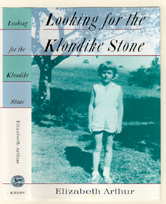 |
|
QUOTES FROM REVIEWS OF LOOKING FOR THE KLONDIKE STONE
Published by Alfred A. Knopf, June 1993
|
|
Out of her five summers at Camp Wynakee in Dorset, Vermont, Elizabeth Arthur has made a stunningly good book. [If you prefer to read a novel] that novel had better be by someone such as J.D. Salinger or Jane Austen if it's to give you more pleasure than Looking for the Klondike Stone . . . Elizabeth Arthur's account rises far above articulateness. To begin with, she has a memory easily equal to Proust's or Wordsworth's (I'm thinking of "The Prelude") . . . She does a masterly evocation of Eden. More than memory, though, Arthur has amazing powers of description. As I read Looking for the Klondike Stone, two things happened simultaneously. One was that I got a vivid sense of what it would be like to be a little girl, how everything would look and feel and taste, what would matter a lot and what hardly at all. Seldom have I so nearly walked in someone else's moccasins. But at the same time I did some walking of my own.
Noel Perrin, The Boston Globe, June 27, 1993
|
|
Like many people, I have a small select shelf of books set aside for re-reading each summer...This shelf holds The Wind in The Willows, Eudora Welty's Delta Wedding, Owen Johnson's Lawrenceville Stories, and now Looking for the Klondike Stone, an absolutely enchanting work that deserves a place by every hammock from Rehoboth to Rockaway Beach...This is a work of nearly Proustian intensity, a sort of a la recherche du camp perdu . . . Arthur's ability to convey the impressions of her childhood is eerie, almost supernatural. Her prose is lyrical, laced with the melancholy that comes from an adult's knowledge that paradise is always lost and wilderness once despoiled does not return. But her writing is whimsical, too, and sometimes almost surreally funny . . . The last pages of her book were so lovely, so sad and true in their evocation of beauty and childhood and loss that I had tears in my eyes and I bet you will, too . . . Those of us too old for Wynakee have Elizabeth Arthur's wonderful gift of Looking for the Klondike Stone, a distillation of the best summer you ever knew: literary alchemy at its most magical.
Elizabeth Hand, Washington Post Book World, June 20, 1993
|
|
Elizabeth Arthur's girlhood memoir, Looking for the Klondike Stone, contains not a single false step...It is as delicate as gossamer . . . This book is a memory feast - a rich, detailed evocation of a time of wonder and innocence and daring, written after such concentrated cultivation and nurturing that for a time, at least, it convinced this portly gentleman in his mid-50's that he was inside the mind of the lively and curious eight year old girl. Or, perhaps even better, that he was inside the mind of a fiercely intelligent adult looking back with great honesty at the child she was.
Geoffrey Stokes, The Boston Sunday Globe, Sept. 19, 1993
|
|
Arthur wins your heart instantly in this "memory feast" about her epiphanic summer-camp experiences . . . In prose of unfailing dazzle and profound specificity, Arthur lovingly describes every aspect of this enchanted place . . . Arthur's pleasure in and gratitude for these seminal times are rendered vividly tangible, as electrifying as touch, warming as sun, and refining as poetry. An inspired and magical storyteller, she makes her unforgettable memories somehow ours.
Donna Seaman, Booklist, June 1 & 15, 1993
|
|
As children, we live with an emotional intensity, gathering memories of a magical time or place that sustain us in our adulthood. For writer Arthur, the five summers she spent at Camp Wynakee in Vermont's Green Mountains during the 1960's were so enchanted that, between visits, she would indulge in "memory feasts" . . . In this lovely memoir, Arthur relives a typical summer . . . Beautifully written and a joy to read, this is highly recommended.
Wilda Williams, Library Journal, June 15, 1993
|
|
To fully appreciate novelist Arthur's memoir of the five childhood summers she spent at a Vermont camp in the early 1960's, readers must slow themselves to a sun-drenched amble . . . the author's hypnotic voice proves compelling.
Publisher's Weekly, May 17, 1993
|
|
Novelist Elizabeth Arthur's memoir of the five summers she spent as a child at Camp Wynakee in the Green Mountains of southern Vermont is, like the best memoirs, uniquely personal, yet universal. It details specific moments and places that nevertheless belong to the timeless realm of childhood . . . Like Annie Dillard in "An American Childhood", Arthur writes lyrically about the unfolding of a young girl's consciousness, her interaction with the natural world, and her quest to find her place in it.
Chicago Tribune, Sept. 3, 1993
|
|
[In Looking for the Klondike Stone] gently, diligently, and without stooping to the sentimental, Arthur traces her creative and spiritual roots to five idyllic summers in the green hills of Vermont . . . Arthur writes with flawless clarity, mixing childhood awe and honesty in equal doses. Always elegant and evocative, her prose can make even bug juice sound magical. Arthur can also be pithy and tongue-in-cheek . . . Looking for the Klondike Stone is a generous celebration of youth and a poignant reminder of the potential inherent in us all.
Nancy Middleton, Belles Lettres, Vol. 9, #3
|
|
In this enchanting memoir, Arthur recalls her childhood summers at a camp in Vermont, evoking the passions of youth, the routines of camping and the sense of place . . . This narrative of children's delights - campfires, woodland hikes - in a lovely landscape is also a collection of lessons on how to be parents and teachers.
The New Yorker, 1993
|
|
A loving celebration of those special refuges of childhood that are forever the measure of happiness for those fortunate enough to have known them...Like the author's camp memories, better savored then wolfed down: a splendid evocation of wisdom acquired in a demi-Eden by a writer of great grace and sensitivity.
Kirkus Reviews, May 1, 1993
|
|
 UP TO TOP UP TO TOP |
|
| |
|
“Camp Wynakee lay in a hollow of the hills . . . .” So begins Elizabeth Arthur’s luminous memoir of her five perfect seasons at a camp called Wynakee in the Green Mountains of southern Vermont - a paean to youth, to summer and to enchanted places.
Elizabeth is in her fourth summer as a camper when we first meet her - at age ten, arriving at Wynakee in the back of her stepfather’s Jeep, “dressed in new shorts, a new shirt, new sneakers and a new cap, like any pilgrim ready to be reborn.” Possessed of a child’s remarkable ability to endow the events of her days with symbolic significance, she is poised to make the most of every moment.
With her we enter a world where the comforting daily routine begins with “the chimes of a great brass bell ringing and ringing in waves of deep sound across the meadow and the woods”- a sound “which I never tired of hearing, and which said to me not just ‘Listen,’ but ‘I hear you’:; where skinny dipping with other girls in the pond at night, the water “like black velvet stroking every neuron,” is a chance to learn “the bliss of bodies, and the deep comfort of forgetting, for the time, our differences”; where a long hike to the Fire Tower on a day when “the heat lay around us like a piece of birch bark carefully cut and ready to be set to flame” may culminate in the realization that “the world itself was a kiln, and that all things, including me, were fired in it”; where on one special day each summer - Klondike Day - the counselors transform the camp into a dream of the Wild West.
On Klondike Day gold-painted rocks, hundreds of them, are scattered through the hills for the campers to seek and find; one stone - and only one - is the Klondike Stone, the true treasure, whose finder, chosen by fate itself, is “cleansed, remade, newly wrought.” To Elizabeth it is the emblem of the miracle of Wynakee, where a child who has known since her parents’ divorce that “things you love can vanish” might experience during a few brief seasons a measure of happiness that will nourish her for a lifetime.
Light of touch, written in a style of great lyric generosity, this is a book to remind us of the joyful seriousness and awe-filled intensity of childhood. In Looking for the Klondike Stone it will be forever summer in Vermont, where the pervasive magic of a place called Wynakee is elevated to the status of myth by an extraordinary child on a quest to discover the meaning of the world. It is destined for the small shelf of classic American memoirs that capture a time, a place, a life in which we all can find ourselves.
|
 UP TO TOP UP TO TOP |
|





